Our approach to raising American Guinea hogs is driven by a deep commitment to sustainability, animal welfare, and responsible farming practices. Our intentional decision to keep a small pig herd size is a reflection of our dedication to preserving and nurturing the natural grazing areas on our farm.
Lots of clean air and sunshine like nature intended
TnF Farms had approximately 3 dedicated acres of carefully fenced pasture, forested areas, and creek bottoms where our pigs roamed freely. This approach allowed them to graze on real, unprocessed food. It also ensures they had access to diverse environments, from sunny pastures to cool forested areas and refreshing creek beds. To further enhance their well-being, we’ve created a man-made sand-bottom wallow. Our American Guinea hogs also had access to a natural spring, allowing them to cool off and enjoy a bit of mud as they pleased.
Our commitment to the welfare of our hogs extends to how we sheltered them. Multiple well-constructed shelters were strategically placed across the pasture, providing our hogs with relief from the weather, be it rain, shine, or wind.
Healthcare for our hogs was a top priority. Regular veterinary maintenance ensured that they were in optimal health, and we took a proactive approach to disease prevention, minimizing needs for antibiotics or hormones.
Challenging stereotypes
It’s essential to challenge common misconceptions about pigs. While they are often stereotyped as “dirty” and “mean,” these traits are not inherent but rather situational. Pigs can be clean animals if they haven’t been rooting in the soil or cooling off in mud. They also do not defecate where they sleep. American Guinea hogs, in particular, are known for their mild temperament, and ours were no exception. Regular interaction with our hogs fostered a bond that makes them behave more like outside dogs, further challenging stereotypes and emphasizing their amiable nature.
At TnF Farms, our approach to raising American Guinea hogs is a testament to our values of sustainability, compassion, and ethical farming practices. We take great pride in providing our hogs with a nurturing and natural environment where they can thrive and lead contented lives.
- Pasture and forest vegetation including roots, tree nuts and fruit
- Wildlife and insects living in the grass and streams
- Hay
- Fruits and vegetables year round, pumpkin and squash in the fall
- Supplemental freshly milled mineral blend from a local feed store
- The American Guinea hog is a Heritage breed
- Smaller, black pigs with a good temperament
- Adults can grow to 400 pounds
- Great tolerance for the Florida weather
- Flavorful, tender, darker pork
- Excellent for bacon, charcuterie, sausages and lard
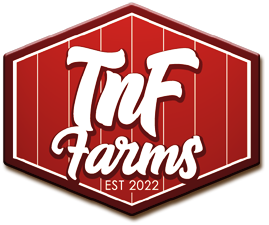
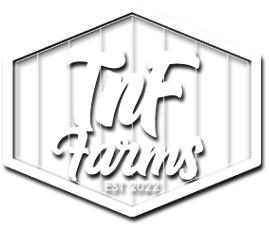
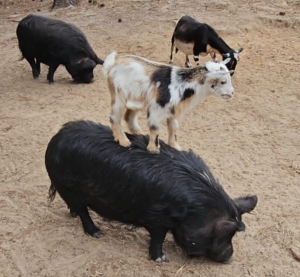
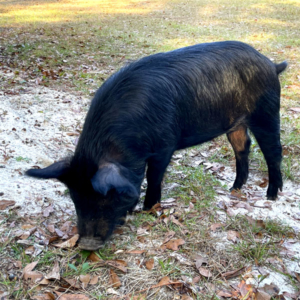
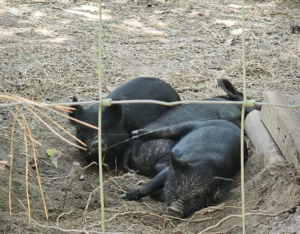
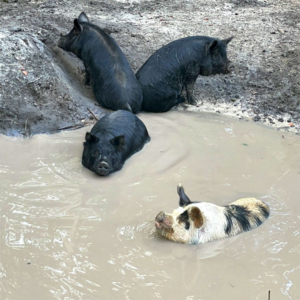
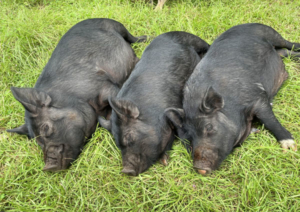
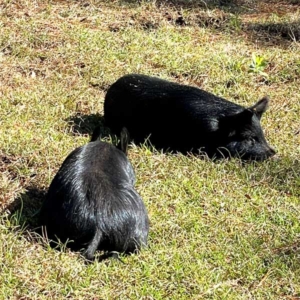
Growing lemons in Florida
/in American Guinea Hogs, Farm Animals, Florida Living, Homesteading, Nigerian Dwarf Goats/by FaithWhen we bought the property that is now TnF Farms, we saw that there were some mature fruit trees on the property. We thought they may have been pears. No, they were lemons. The first late fall harvest, we were pretty excited. The lemons were big and bright yellow. We cut into one and it was full of seeds. We tried a couple of others and they were very seedy. Then we tasted one and discovered it wasn’t pleasantly tart, but punishingly bitter. No amount of sugar added to this fruit would make lemonade, lemon curd, or lemon bars.
Building our Goat Tote
/in American Guinea Hogs, Farm Animals, Florida Living, Homesteading, Let's Do Something, Nigerian Dwarf Goats, Nubian Goats/by TimIt’s soon 2024. Perhaps you’ve been living under a rock. Let me prep you before you emerge from ignorant bliss. Everything costs more. Too much more. For some items the pricing is ridiculous. I have been on the lookout for a livestock trailer. For months, I have cruised Craigslist and Facebook Marketplace and have concluded there are 2 kinds of used livestock trailers available in the open market right now:
Feeding pigs food waste
/in American Guinea Hogs, Farm Animals, Homesteading/by FaithIn the beginning stages for TnF Farms, we did investigate this very subject. Food waste, also classified in this publication as garbage is free. There’s plenty of food waste available and pigs are not picky eaters. Ultimately we decided against it because we did not want our livestock living on stale, processed and rotting food. Much today’s human population is overweight and not in the best of health. Diabetes, hypertension, and other food related disease is more common now. Our decision to raise healthy, free ranging livestock was easy. Tim and I believe what’s wrong with everybody’s health is the GMO (genetically modified organism), processed and unnatural food that has become common now.